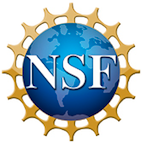Wang Receives NSF Grant to Develop GPS and LIDAR Education at UH
Project Will Add Upper-Level Applications Course and Augment Field Methods Course

Guoquan (Bob) Wang, assistant professor in the Department of Earth and Atmospheric Sciences, received a three-year National Science Foundation (NSF) award for $168,000 to integrate two geodetic technologies into geosciences education at UH.
The project integrates Global Positioning Systems (GPS) and Light Detection and Ranging (LiDAR) into the undergraduate geosciences curriculum. Project plans for the technology integration include:
- Creating a new upper-level applications course at UH;
- Augmenting an existing field-methods course at the Yellowstone Bighorn Research Association (YBRA) field camp with GPS and LiDAR applications; and
- Conducting professional development workshops for college faculty to incorporate GPS and LiDAR into their own courses at different levels of the curriculum.
Plans include the installation of one real-time, high-rate GPS station at the YBRA field camp that is located a few miles south of Red Lodge, Montana. The UH Department of Earth and Atmospheric Sciences offers two sessions of Geology Field Camp and one session of Geophysics Field Camp each summer at YBRA.
The YBRA GPS will be co-located with a U.S. Geological Survey Advanced National Seismic System Backbone seismic station. “The high-rate GPS and seismic instruments will be a perfect field lab for teaching principles of earthquake monitoring, plate motions observing, and field instrumentation,” Wang said.
Several other organizations and universities, including Pennsylvania State University, Southern Illinois University, Cincinnati Museum Center, and New Jersey State Museum, also offer geology, geophysics, and environmental field courses at YBRA. Each summer, more than 200 undergraduates attend field courses there.
“Montana is the state with the sparsest permanent GPS coverage,” Wang said. “The GPS station will significantly contribute to the local education and land survey communities.”
The YBRA GPS station will also extend the Eastern Basin Range and Yellowstone Hotspot GPS Network (EBRY) operated by University of Utah and will contribute to the study of geodynamics and evolution of the Yellowstone Hotspot.
Wang’s project will also install one real-time, high-rate GPS station at the UH Coastal Center (UHCC), located in central Galveston County approximately 14 miles northwest of the Gulf of Mexico. The UHCC GPS station will be co-located with two deep seismic wells installed by UH’s Allied Geophysical Laboratories. The GPS station and seismic wells will become a field geophysics education facility for UH students.
The UHCC GPS will also be integrated into HoustonNet, an NSF-funded large project to conduct subsidence monitoring in the Houston metropolitan area. Wang is also the principal investigator of the NSF HoustonNet project.